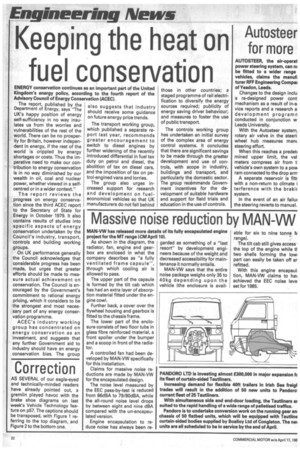Keeping the heat on fuel conservation
Page 14

If you've noticed an error in this article please click here to report it so we can fix it.
ENERGY conservation continues as an important part of the United Kingdom's energy policy, according to the fourth report of the Advisory Council of Energy Conservation (ACEC).
The report, published by the Department of Energy, says "The UK's happy position of energy self-sufficiency in no way insulates us from the worries and vulnerabilities of the rest of the world. There can be no prosperity for Britain, however independent in energy, if the rest of the world is crippled by energy shortages or costs. Thus the imperative need to make our contribution to energy conservation is in no way diminished by our wealth in oil, coal and nuclear power, whether viewed in a selfcentred or in a wider context."
The report reviews the progress on energy conservation since the third ACEC report to the Secretary of State for Energy in October 1979. It also contains results of studies into specific aspects of energy conservation undertaken by the Council's industry, transport, controls and building working groups.
On UK performance generally the Council acknowledges that considerable progress has been made, but urges that greater efforts should be made to measure actual achievement on conservation. The Council is encouraged by the Government's commitment to rational energy pricing, which it considers to be the strongest and most necessary part of any energy conservation programme.
ACEC's industry working group has concentrated on energy conservation as an investment, and suggests that any further Government aid to industry should have an energy conservation bias. The group also suggests that industry should receive some guidance on future energy price trends.
The transport working group, which published a separate report last year, recommends greater encouragement to switch to diesel engines by further widening of the recently introduced differential in fuel tax duty on petrol and diesel, the abolition of tax on diesel cars, and the imposition of tax on petrol-engined vans and lorries.
The group also urges increased support for research and development on fueleconomical vehicles so that UK manufacturers do not fall behind those in other countries; a staged programme of rail electrification to diversify the energy sources required; publicity of energy saving driver behaviour; and measures to foster the use of public transport.
The controls working group has undertaken an initial survey of the complex area of energy control systems. It concludes that there are significant savings to be made through the greeter development and use of controls, with scope in industry, buildings and transport, and particularly the domestic sector. The group recommends Government incentives for the development of suitable hardware and support for field trials and education in the use of controls.




































































